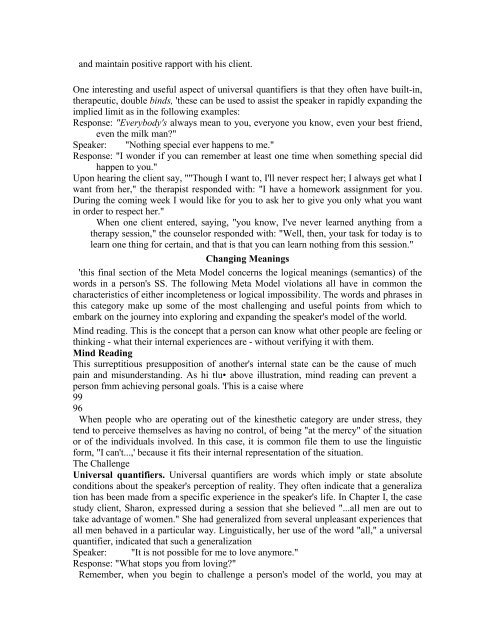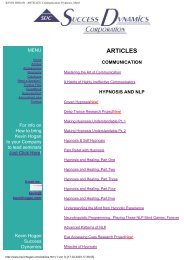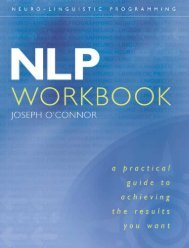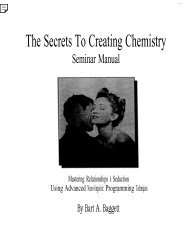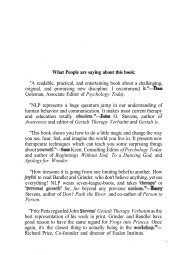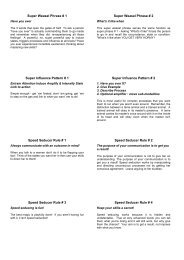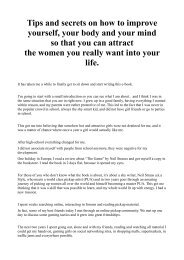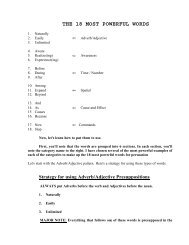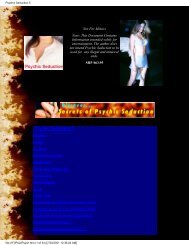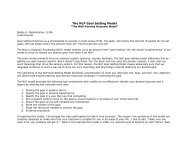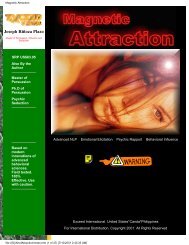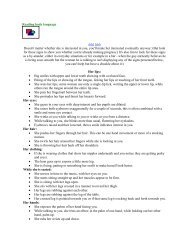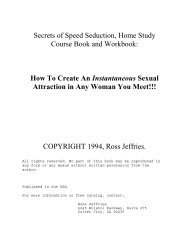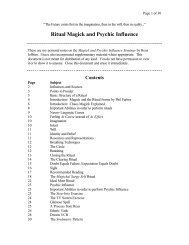A Pragmatic Guide To Communication & Change.pdf - NLP Info Centre
A Pragmatic Guide To Communication & Change.pdf - NLP Info Centre
A Pragmatic Guide To Communication & Change.pdf - NLP Info Centre
- No tags were found...
You also want an ePaper? Increase the reach of your titles
YUMPU automatically turns print PDFs into web optimized ePapers that Google loves.
and maintain positive rapport with his client.<br />
One interesting and useful aspect of universal quantifiers is that they often have built-in,<br />
therapeutic, double binds, 'these can be used to assist the speaker in rapidly expanding the<br />
implied limit as in the following examples:<br />
Response: "Everybody's always mean to you, everyone you know, even your best friend,<br />
even the milk man?"<br />
Speaker: "Nothing special ever happens to me."<br />
Response: "I wonder if you can remember at least one time when something special did<br />
happen to you."<br />
Upon hearing the client say, ""Though I want to, I'll never respect her; I always get what I<br />
want from her," the therapist responded with: "I have a homework assignment for you.<br />
During the coming week I would like for you to ask her to give you only what you want<br />
in order to respect her."<br />
When one client entered, saying, "you know, I've never learned anything from a<br />
therapy session," the counselor responded with: "Well, then, your task for today is to<br />
learn one thing for certain, and that is that you can learn nothing from this session."<br />
Changing Meanings<br />
'this final section of the Meta Model concerns the logical meanings (semantics) of the<br />
words in a person's SS. The following Meta Model violations all have in common the<br />
characteristics of either incompleteness or logical impossibility. The words and phrases in<br />
this category make up some of the most challenging and useful points from which to<br />
embark on the journey into exploring and expanding the speaker's model of the world.<br />
Mind reading. This is the concept that a person can know what other people are feeling or<br />
thinking - what their internal experiences are - without verifying it with them.<br />
Mind Reading<br />
This surreptitious presupposition of another's internal state can be the cause of much<br />
pain and misunderstanding. As hi tlu• above illustration, mind reading can prevent a<br />
person fmm achieving personal goals. 'I'his is a caise where<br />
99<br />
96<br />
When people who are operating out of the kinesthetic category are under stress, they<br />
tend to perceive themselves as having no control, of being "at the mercy" of the situation<br />
or of the individuals involved. In this case, it is common file them to use the linguistic<br />
form, "I can't...,' because it fits their internal representation of the situation.<br />
The Challenge<br />
Universal quantifiers. Universal quantifiers are words which imply or state absolute<br />
conditions about the speaker's perception of reality. They often indicate that a generaliza<br />
tion has been made from a specific experience in the speaker's life. In Chapter I, the case<br />
study client, Sharon, expressed during a session that she believed "...all men are out to<br />
take advantage of women." She had generalized from several unpleasant experiences that<br />
all men behaved in a particular way. Linguistically, her use of the word "all," a universal<br />
quantifier, indicated that such a generalization<br />
Speaker: "It is not possible for me to love anymore."<br />
Response: "What stops you from loving?"<br />
Remember, when you begin to challenge a person's model of the world, you may at


